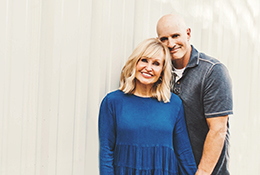
Expect Less, Get More
Does your marriage meet all your expectations? Bob Lepine, Ron Deal, Gary Chapman, Juli Slattery, Charlie and Kirstie Dates, and Dave and Ann Wilson discuss expectations in marriage from the 2020 Love Like You Mean It® marriage cruise.
Show Notes
About the Guest
-
- Bonus Audio Q&A about sex and intimacy. (MP3 32.3 MB) https://mp3.familylife.com/fl2020-03-04-bonus.mp3
- Book now for the Love Like You Mean It® marriage cruise. https://www.lovelikeyoumeanitcruise.com/
- Find resources from this podcast at https://shop.familylife.com/.
- Check out all that's available on the FamilyLife Podcast Network. https://www.familylife.com/familylife-podcast-network/
- Have the FamilyLife Today® podcast and resources helped you? Consider becoming a Legacy Partner, a monthly supporter of FamilyLife. https://www.familylife.com/legacy
-

Bob Lepine
Bob Lepine is the Lead Pastor at Redeemer Community Church in Little Rock, Arkansas which he helped plant in 2008. He also serves on the Board of Directors for the Great Commission Collective, a church planting ministry connecting more than 150 churches world wide. Bob also hosts Mornings on Family Radio, a network of more than 70 radio stations in the US. He is also well known to radio and podcast listeners as the long-time co-host of FamilyLife Today® and as the on-air announcer for Truth...more
Dave and Ann Wilson
Dave and Ann Wilson are hosts of FamilyLife Today®, FamilyLife’s nationally-syndicated radio program. Dave and Ann have been married for more than 38 years and have spent the last 33 teaching and mentoring couples and parents across the country. They have been featured speakers at FamilyLife’s Weekend to Remember® marriage getaway since 1993 and have also hosted their own marriage conferences across the country. Cofounders of Kensington Church—a national, multicampus churc...more
Gary Chapman
He has degrees from some of the most respected colleges and seminaries. He's written some of the best-selling books of the past decade and appeared on numerous radio and television programs across the country. But Dr. Gary Chapman knows more than just a lot of scholarly theories and practical advice—he knows people. He knows how to relate to people, how to have fun and how to make people laugh, all the while giving practical tools to help improve relationships.
Juli Slattery
Dr. Juli Slattery is a widely known clinical psychologist, author, speaker and broadcast media professional. She's the president and co-founder of Authentic Intimacy. She hosts a podcast called Java With Juli, where she answers tough questions about relationships, marriage, spiritual, emotional and sexual intimacy. She has authored eight books, including 25 Questions You're Afraid to As...more
Ron Deal
Ron L. Deal is one of the most widely read and viewed experts on blended families in the country. He is Director of FamilyLife Blended® for FamilyLife®, founder of Smart Stepfamilies™, and the author and Consulting Editor of the Smart Stepfamily Series of books including the bestselling Building Love Together in Blended Families: The 5 Love Languages® and Becoming Stepfamily Smart (with Dr. Gary Chapman), The Smart Stepfamily: 7 Steps to a Healthy Family, and ...more
Bob Lepine, Ron Deal, Gary Chapman, Juli Slattery, Charlie and Kirstie Dates, and Dave and Ann Wilson discuss expectations in marriage from the 2020 Love Like You Mean It® marriage cruise.
Expect Less, Get More
Bob: Almost nobody, who’s married, sets out to intentionally pursue an extramarital affair, and yet extramarital affairs still occur. Ron Deal explains how they begin.
Ron: What happens is you have a working relationship that turns into a friendship. One day, somebody kind of does something vaguely flirtatious; and somehow it wasn’t denied, or there was no big message that said, “No, don’t ever do that again.” A passage of time goes by and then there’s another little thing. This is how an affair starts.
Bob: This is FamilyLife Today for Thursday, March 5th. Our hosts are Dave and Ann Wilson; I'm Bob Lepine. You’ll find us online at FamilyLifeToday.com. We’re joined by a panel of marriage experts today to talk about how we can safeguard our marriage and pursue oneness in our relationship. Stay with us.
And welcome to FamilyLife Today. Thanks for joining us on the Thursday edition. We’ve been spending time this week giving our listeners a taste of what we experienced a few weeks ago on board the Love Like You Mean It® marriage cruise. I say a taste, although the buffet has been a little different this week.
Ann: I think I gained ten pounds on that cruise! [Laughter]
Dave: Now we’re working it off.
Ann: I’m not having ice cream two times a day.
Bob: Well, I read that—
Dave: Two! We had it like five; every time you walk by the soft-serve cone, you just grab one. [Laughter]
Bob: I read that verse in the Bible about “I buffet my body,” and I thought, “That’s what this means,” so I was trying—
Ann: That’s what we do on the cruise. [Laughter]
Bob: We had a great time. In fact, I just want to remind listeners: “If you’d like to join us on the 2021 Love Like You Mean It marriage cruise, we’re about 60 percent sold out already. We expect we’re going to sell out in the next 30-60 days.” If you register between now and March 16—we’re calling this Madness ’21; it’s our own March Madness—so go to FamilyLifeToday.com. You can register, save $300 per couple off your stateroom for next year; that’s good until March 16. Or call 1-800-FL-TODAY if you have any questions or if you’d like to reserve your spot. Again, our website: FamilyLifeToday.com; or call 1-800-358-6329—1-800-“F” as in family, “L” as in life, and then the word ,“TODAY,” to join us on the Love Like You Mean It marriage cruise.
One of the things we did this year was we got a panel of speakers together: the three of us; Ron Deal, who gives leadership to FamilyLife Blended®; Dr. Juli Slattery, who’s an author and a speaker; Dr. Gary Chapman, who wrote The Five Love Languages, spoke on board the cruise about the language of apology; Dr. Dates and his wife, Kirstie, were also speakers on board the cruise, and they joined us on this panel.
We had cruisers who submitted questions to us, using their app. We tackled some of those hard questions in a panel discussion. Today, we thought you should hear some of the questions. They’re challenging questions; but having that panel there, we got some great answers.
Dave: We got some great answers, and I think everybody was super real and transparent. You got a look into their life; but the wisdom—I learned as much as anybody on the cruise.
Ann: I felt like that, too. These guys were amazing. I appreciated them being so authentic and using their wisdom and their expertise to help us.
Bob: Let’s go back to the panel and hear some more of the questions and answers from the Love Like You Mean It marriage cruise.
[Panel Discussion Aboard the Love Like You Mean It Marriage Cruise]
Bob: Somebody said: “My husband puts me down regularly. I don’t think he realizes it. How do I bring that up? How do I help him?” What’s your counsel here?
Gary: Well, I think if you start criticizing him for the way he criticizes you, it’s a downward spiral. I think you look for positive things about him; you begin to affirm him in the positive things and speak his love language, for sure. Then, over three or four months of that, you can start making requests of him. He’s far more likely to respond to it in a positive way towards you.
Bob: Ann, do you ever, in a situation like that, just say, “We need to have a talk,” and just call it like it is?
Ann: Well, I did this very poorly for many, many years; because I would say things like, “Are you saying I’m so stupid?!” and I would just get angry. I think, instead of saying that and being so defensive, I would tell Dave in a calm manner—like: “This is what it makes me feel when you say that,” or “When you’re talking like that, this is how I’m feeling.” Then he could hear me; but when I respond with such a rough and terrible tone, he’s not receiving anything.
Dave: Here’s what really happened. [Laughter] She said that often—that I’m harsh. She’d look at me and say, “You can’t hear that?” I’m like, “I’m not harsh!”—just like that! I couldn’t see it.
Here’s the other thing I would say to do: I know what you’re going to say, “Pray.”
Ann: I did pray; and I said, “God, he doesn’t see it, and I don’t know how to communicate it anymore.” So, you guys, this one day—
Dave: I was going to say this, but go ahead.
Ann: He’s videoing our kids. He gets really angry and upset, and he’s talking to me in the same tone—
Dave: —long time ago. [Laughter] That never happens anymore! [Laughter]
Ann: So that goes on. I’m like, “You”—and I said, “You’re doing it right now!” He goes, “Whatever!”
Our family comes in to watch this video that he made of the kids—and he never turned off the camera—so he heard himself talking like this on video. My whole family is in the room; and they all look at him like, “Dude!”
Dave: That really happened; and the whole family looked at me like, “You’re a jerk!” I was looking at it, going, “You’re a jerk”; because I was a jerk. I saw it in living colors—like: “Everything she’s been saying all these years was true.”
I’m just telling you—if your wife/if your husband’s been speaking the truth, listen! We’re so defensive and we’re so selfish, we can’t see it; it’s probably true. Then you have to say, “Okay, God; change me.”
Bob: If your husband is being harsh, get your camera out and shoot a video?—is that what you’re saying? [Laughter] “Wait! Do that again, just so I have photographic evidence here.”
The opposite side of that—somebody said: “How do I esteem my wife? What does it look like? Where is the right place to do this?”
Gary, as I read that question, I thought: “It really depends on what her love language is; because if I were to publicly esteem my wife, she might feel embarrassed by that. She might need to be more privately esteemed than publicly esteemed. We need to be students of one another to know how to do this”; don’t we?
Gary: Yes; I think you begin by discovering each other’s love language, and speak that love language fluently. Then I think, also, periodically you ask questions: “How could I be a better husband?” “What could I do that would make you feel better?” “What could I do that would enrich your life?” I mean, they’re the expert on themselves. You ask the questions, they’ll give you answers. Now you have information on how to do it.
Bob: Juli, what has your husband done that esteems you?
Juli: You know, it’s interesting that this man used the word, “esteem”; because I don’t think any woman is like, “I want my husband to esteem me,”—like that’s a man-thing. We really want to feel cherished and valued, so it’s slightly different. It’s not always just, “You’re good at this,” and that sort of thing, which is, I think, more a man’s language.
My husband appreciates me. He does so many things to let me know that he loves me. Every night when I make dinner, he’ll thank me like four times: “Thank you so much for making dinner!” I’ll be like, “Oh, sure; it’s nothing.” He’s like, “Well, you made it!” Just those little things to let me know that he sees me, that he loves me, he values me. Over time, he’s learned love languages that pour into that tank.
Bob: Kirstie, how does Charlie cherish you?
Kirstie: Well, he’s a talker.
Bob: Charlie, take notes here.
Charlie: Alright. [Laughter]
Kirstie: He’s a talker. While I don’t need to be publicly affirmed, I do know that that is one of my primary love languages. Just having those talks privately, in the areas that he knows that I need encouragement, is one way he does that.
Bob: He’s shooting video!
Charlie: “Note to self!”
Bob: He’s shooting video of his wife, giving this answer, and pointing! [Laughter]
Ron: And that’s note-to-self, right there. That’s really a student. I’ll remember this later, and what a nice gift for all of us to be able to do.
Dave: I would just add—I know we know this, but I would never underestimate Proverbs 18:21. It is so true that the power of life and death is in our tongue/in our words. Whether it’s your love language or not, every person lights up when somebody speaks life.
I tell you—this woman speaks life to me. It’s unbelievable. She didn’t used to; but she has for the last 25 years, and it’s unbelievable. You’re like: “I want to come home to that. I want to run home to that,” whether it’s wife to husband or husband to wife.
Ron: Let me just connect our last two thoughts: “How do you approach somebody with something that is not going well in the relationship?” and “How do you, perhaps, pour into them in the same moment?”
I think there’s a lot of wisdom in saying, “You matter to me; and because I want more of our ‘us-ness,’ I need to tell you about something you do that really hurts.” You lead with: “Because you matter…” “Because you’re valuable to me…” “Because you’re important to me…” “Because I am committed to you…” / “…that’s why I need to point this out to you, because it’s getting in the way of our ‘us-ness.’”
I think leading with that sort of, “My heart and intent in bringing this to your attention”—this problem—“is so we can be closer.” That’s the point that you bring anything up; but often, we just skip over that and we get right to, “You’re a jerk.” Now, criticism meets criticism, like Gary said, and it spins in the wrong direction.
Bob: If you do that gently, lovingly, kindly: “I love you; I love us. I want us to grow. Here’s something…”
Ron: No guarantees.
Bob: If that person responds defensively and says: “So you’re saying I’m the problem? I can point out things about you that you’re doing wrong,” and now we’re into conflict; and you just kind of back off. What do you do in that moment?
Ron: “Bob, I can tell what I just said to you kind of taps something. Do you mind telling me what that is?”
Bob: “I’m not talking to you about this; okay?!” [Laughter]
Ron: Well, that’s what I would do with my spouse! “Whoa; your defensiveness—I’m not sure what that is. Do you mind telling me what just happened in you?”—right? I shift from what I need you to hear to what you just experienced when I brought this to your attention. Maybe, just maybe, they’ll go: “I don’t know what that is. I don’t have any idea what that is.”
“I don’t know. I’m just trying to connect us a little bit better. Sorry it tapped into something. Can we sit with that a minute?” What you’re trying to get at is: “What is the thing going on in the other person that prevents them from hearing this problem for you?” There are layers, and you just have to shave off layers.
When you find yourself kind of stuck in something—there’s no one thing: “Say this, and everything’s better,”—we have to slow. We have to listen; we have to calm; we have to try to look inward; we have to try to get humble: “God, show me what this thing is in me that makes me rise up.” Ultimately, we have to try to die to ourselves as we help each other figure that out.
Bob: There is something about the fact that conflict can’t sustain itself over a long time if one person is remaining gentle, and humble, and patient with the other one. If you’re angry, and your spouse is calm and gentle, it’s hard to keep that energy going. The Bible says, “A gentle answer turns away wrath.” If we can do that—if we can maintain the emotional composure in that moment—it can maybe help drain some of the negative emotional energy out and get us back to where we can have conversation.
Dave: I love what—you know, when you think about: when one person escalates, if the other escalates, you’re in conflict; but if somebody de-escalates—couples ask us all the time—because we talk about that in Vertical Marriage, that somebody has to de-escalate—they say, “Well, who should do that?”
Here’s the answer: “Whoever’s most mature, make the first move,” which is like—that’s Emerson Eggerichs in Love and Respect—but it’s like, “Whoa!”—because you’re thinking they should; but no, you make the move.
Bob: Right; Charlie, what were you going to say?
Charlie: Something that we’ve/I’ve tried to practice—I’m certainly not great at it—is the idea that uncommunicated expectation is premeditated conflict.
Bob: That’s good.
Charlie: Part of, when I sense conflict coming, is to say, “Well, this is what I expect…”—try to get Kirstie to communicate what she’s expecting—because clearly, I missed it. She has something she’s looking for that didn’t register on my radar. If I can get her to communicate those expectations, and if I can communicate my own, then hopefully we can avoid some of that conflict.
Bob: Yes; one of the questions that came in was: “What do you do to try to resolve conflict and forgive your spouse if he or she never, never apologizes?—never says, ‘I’m sorry; I was wrong,’ but is always defensive.” Juli?
Juli: Well, I think part of it is realizing that forgiveness is first an attitude of the heart before God; and forgiveness is the determination that “I’m not going to punish my spouse for doing this.” Forgiveness isn’t always just this two-way street, where, “I can’t forgive you unless you ask”; we have to have a heart toward God that says, “I’m not going to hold that against them.”
I think there are spouses who, because of the way they grew up, the words, “I’m sorry, will you forgive me?” they don’t know how to say those words; because to them it means: “I’m admitting that I’m a failure; I’m all bad, and those words are too threatening.”
But often, if you have a spouse that has difficulty or can’t even say those words, they do other things to tell you that they’re sorry: they’re kind to you—these other love languages—they buy you flowers; they do acts of service. They may work around saying, “I’m sorry,” or taking responsibility; so work from there.
It’s the two things of your attitude towards the Lord, in terms of: “I’m not going to hold a grudge. I’m going to return even a blessing for a curse”; and then, second of all, recognizing the ways that your spouse does apologize. I think you [Gary] wrote a book called The Five Languages of Apology.
Gary: Yes, the new title is When Sorry Isn’t Enough.
Bob: Ann, you would say, “Pray in this situation.” I mean, if you’re in this, and it’s frustrating, rather than confronting first, pray first; right?
Ann: Yes, I think that that’s one of the biggest lessons that God taught me. Instead of approaching Dave first and confronting him, I felt like God was saying, “Come to Me first and ask certain questions, like: ‘Father, what should I say?’ ‘Should I say anything?’ and ‘When should I say it?’” If we can have the self-discipline to go to our Father first—who’s waiting for us, who wants to speak to us—I think that always has great benefit.
Bob: A lot of the questions we received were about what I would call emotional intimacy—about just how we relate to one another and about some of the challenges that we experience. Somebody wrote in and said, “Can you help us understand jealousy and the difference between a healthy”—because there’s a healthy jealousy in marriage —“and an unhealthy jealousy?” Juli, do you have thoughts on that?
Juli: Yes, I think there is something that you have to realize: “It is healthy to be jealous in marriage, and it’s really the only relationship on planet earth where it’s healthy to be jealous.” I don’t want another woman flirting with my husband; and if I were to be okay with that, there’s something wrong with me. It’s a relationship where there’s a sense of, “We have given ourselves to each other exclusively.” It’s a metaphor of God, and He’s a jealous God. The Scriptures say He’s jealous for us.
So there is a healthy aspect of jealousy, but that is not based in fear. Anytime your jealousy is because of fear, we know that God doesn’t give us a spirit of fear. If my healthy jealousy for my husband is that—he belongs to me; I love him; it’s my privilege to do life with him—and I’m jealous for that, that’s healthy.
As soon as it becomes: “I’m afraid he’s going to go off with somebody else,” or I’m being triggered by something that happened in the past, and I become possessive or paranoid,” that is not from the Lord; and that’s something that needs to be addressed.
Ann: So, Juli, what happens if you have a spouse that, you know, they have lunch with a person of the opposite sex, or they’re interacting on texting, or—let’s say the wife, in this instance, gets jealous. He says: “Stop being jealous. It’s unfounded. There’s nothing to worry about.”
Juli: I think there are two sides to that. I think, from one perspective, I would want to know from that wife: “Where’s that coming from? Is there evidence of this that concerns you? Has he, in the past, crossed some lines with coworkers?”—or even something from your past, that doesn’t relate to him, that might be fear-based.
But the other side of that is, as a loving husband—and as a loving wife, if you’re in the other situation—be sensitive to that. Your heart’s desire should be: “I want my wife to trust me; and whatever it takes for her to trust me, wherever that’s coming from, I’ll be like: ‘Yes, if that makes you feel better, I will not have lunch with a coworker, even if it’s forever, until you really have a sense that: “I’m wholly devoted to you.”’” That’s telling you, as a husband, that your wife needs some reassurance that your eyes are on her, your heart is for her, and that you’re committed to faithfulness.
Ron: Let’s talk about the slippery slope for a minute. I know we had some questions—at least, I think we probably did—nearly every time we do this, there are questions about betrayal.
You know, the slippery slope is a very real thing. Nobody wakes up one day and says, “I think I’m going to have sex with my coworker in the office.” No, that’s not what happens. What happens is you have a working relationship that turns into a friendship. One day, somebody kind of does something vaguely flirtatious; and somehow, it wasn’t denied or there was no big message that said, “No, don’t ever do that again.” A passage of time goes by, then there’s another little thing; and this time, it’s reciprocated on the other—this is how an affair starts.
When we say: “I have to manage those boundaries at every step of the—I have to back way up and try to prevent even the appearance of evil in that case, or even somebody wondering.” No, if I maintain the boundaries way up there, then it prevents anything from happening—a mishap; an unintended whatever; or even the suspicion or worry; the fear, as Juli said—that there might be something going on in a relationship. Managing boundaries is very, very important; and it is a part of faithfulness.
Bob: Let me ask the two women here. I was in the office the other day and a coworker—I noticed her hair was different—I said: “You did something different with your hair. It looks really nice.” Then I thought, “Should I have said that to somebody who’s not my wife?” Am I just freaking out, or—
Juli: I think we live in a culture today that is very difficult for men and women. With the MeToo movement, there have been things brought out into the light that needed to be brought into the light/that needed to be spoken; but it also is creating this dynamic, where I think really wonderful men are afraid to even approach a woman to say something kind like that—especially if you’re in ministry: you’re in a pastoral role or you’re in leadership somewhere. I really empathize with that tension.
But I think people know your character. Bob, I’ve worked around you long enough to know your character—that you’re just being sweet and kind. Women know when there’s a creepy guy, that’s looking at us weird, that’s saying inappropriate things that doesn’t have healthy boundaries. You have to know your heart; you also have to be sensitive to where a woman’s coming from and really ask the Lord for discernment. There are women that have been violated in different ways in the past that you need to protect those boundaries much more, because they’re just more vulnerable. This is where we need brothers and sisters in Christ to really help each other navigate some of these difficult waters.
[Studio]
Bob: Well, again, we’ve been listening to the wisdom of Dr. Gary Chapman, and
Dr. Juli Slattery, Ron Deal, Dr. Charlie Dates and his wife, Kirstie.
Dave: —and Bob Lepine!
Ann: —and Bob Lepine.
Bob: —and Dave and Ann Wilson. We were part of a panel together on board the Love Like You Mean It marriage cruise, here a few weeks ago, and got some great questions. In fact, we got a lot of questions about a subject we didn’t tackle, here on the radio—a lot of questions about romance, and intimacy, and sex in marriage.
Ann: Were you surprised how many questions came in about that topic?
Bob: I wasn’t, because where can you safely ask those questions and get biblical answers?
Ann: That’s when many wives came up to me and said: “Thank you. We don’t know where to go with those questions.”
Bob: Right; that portion of the dialogue is available. We thought rather than play that on FamilyLife Today, we’d make that audio file available as a podcast. You can go to our website, FamilyLifeToday.com, and download about 30 minutes’ worth of questions and answers on romance, and sex, and intimacy.
Dave: There’s some good stuff in there.
Ann: —and it’s from a biblical perspective. I think that’s important.
Bob: People were asking very real questions—I’ll put it that way. Go to FamilyLifeToday.com if you’d like to download the Q&A on sex and intimacy from the Love Like You Mean It marriage cruise.
If you’d like more information about the 2021 cruise, you can find it online as well. We’re about 60 percent sold out for next year. We expect it will sell out in the next 30-60 days. If you’ve always wanted to do this, maybe this is a special year—an anniversary year coming up for you/a special occasion—book your stateroom now so that you don’t call later and find it’s sold out.
If you book before March 16, you’ll save $300 per couple off your stateroom. This is the best offer we make all year long; we really want FamilyLife Today listeners to join us if you can. To get more information, go to FamilyLifeToday.com; or call to register at 1-800-FL-TODAY. Reserve your stateroom; call 1-800-358-6329—1-800-“F” as in family, “L” as in life, and then the word, “TODAY.”
Now, tomorrow, we’re going to hear a FamilyLife Today radio program that we recorded on board the cruise. We had a small audience with us; and we talked to author, Jefferson Bethke, who’s written a book about hustle and hurry—about how busy we all are and how we deal with that. He joins us tomorrow, and we’ll talk about how we slow things down a little bit in our lives. I hope you can tune in for that.
I want to thank our engineers today; and I say engineers because Keith Lynch, and James Youngblood, and Justin Adams were all involved with today’s program. On behalf of our hosts, Dave and Ann Wilson, I’m Bob Lepine. We will see you back tomorrow for another edition of FamilyLife Today.
FamilyLife Today is a production of FamilyLife of Little Rock, Arkansas; a Cru® Ministry. Help for today. Hope for tomorrow.
We are so happy to provide these transcripts to you. However, there is a cost to produce them for our website. If you’ve benefited from the broadcast transcripts, would you consider donating today to help defray the costs?
Copyright © 2020 FamilyLife. All rights reserved.
1
Episodes in this Series


